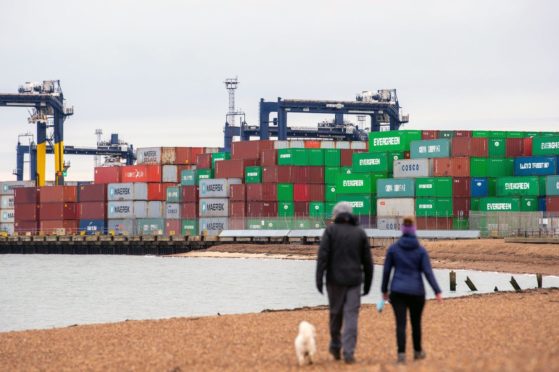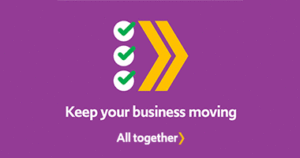
The UK’s new trading relationship with the EU means that businesses are able to seize new opportunities as we strike trade deals with the world’s fastest growing markets.
Outside the EU customs union, there are also new processes and rules which they have been preparing for.
TRANSITION GUIDE
For one-stop-shop transition guide information, businesses should visit gov.uk/transition where company chiefs can also locate a checker tool to assist individual action points.
The UK’s new relationship with the EU started on January 1, bringing updated rules on exports, imports, tariffs, qualifications, hiring and travel. Many businesses were well prepared and are successfully trading.
To keep moving forward, there are steps all businesses can take to adapt to the new changes.
They include:
- Making customs declarations when exporting goods to the EU. You can make the declarations but most businesses use a courier, freight forwarder or customs agent.
- Ensuring you have an EORI number starting with GB. If exporting, you need to check that the EU business you’re exporting to is also ready.
- Checking the need for a visa or work permit.
- Checking the rules on the UK’s new points-based immigration system when hiring from outside the UK.
‘PUSHING FORWARD’
KEVIN STEVENS
CHAIRMAN, WOODLAND GROUP, ENGLAND
“Everyone needs to adjust to these changes” is an Essex logistics company chief’s call to other British operations.
“We gave our clients informed and honest opinions of where we thought the main issues would arise so they could plan accordingly,” explained Chairman Kevin Stevens, whose firm transports up to 8,000 monthly shipments to and from Europe.
“We grew a dedicated team, hosted strategy meetings as well as internal training sessions to get staff across the business up to speed on the latest regulatory changes, building transition training and information resources for our clients.”
“With change comes opportunity. Our forward planning has allowed us to push forward significantly and open up new opportunities for clients trading with the EU,” continued the boss of the global logistic, freight forwarding and supply chain specialists.
“Everyone needs to adjust to these changes and, understanding they are here to stay, put relevant processes in place.”
‘ORDERS FLAT OUT’
ANTHONY PICKERING
PRESIDENT, CONTROL TECHNIQUES, WALES
Planning was the secret of transition success for a Powys company that designs and manufactures electric motor control technology.
“We export to 77 countries, and have 26 sales offices around the world, so we had to be well prepared,” confirmed Control Techniques President Anthony Pickering.
“Planning has been the root cause of our success since January 1 because we’re reliant on our supply chain. Our factories are full. We’re absolutely flat out with orders coming out of our ears.
“We’ve not missed a beat. Our business is continuing to evolve.” He continued: “Our commitment to Europe has actually strengthened because, during the pandemic, we moved our Chinese manufacturing site back to Wales.”
The company “uplifted the factory, put it on a train across Siberia and reinstalled it here” to increase manufacturing capacity.
“It means we truly are a British manufacturer now, which we’re very proud of.”
‘REAPING REWARDS’
ALISON WOOD
FOUNDER, LILYPADS, SCOTLAND
Transition “didn’t seem like a big jump” for an Edinburgh company, now reaping rewards of advance preparations while making progress within the new EU relationship.
When 25 year-old Alison Wood and Mhairi Cochrane, 23, last year launched sustainable hygiene brand Lilypads they knew they had to prepare “pretty quickly” for change.
As well as taking on board professional advice, Alison said: “I used the Brexit checker on the gov.uk website that was really good for pinpointing some of the things we hadn’t thought about.’’ Although there was initial additional admin to take care of, Alison wasn’t daunted by it. Their reusable period pads are manufactured in Lithuania, and the business is truly international, donating 10 per cent of revenue to subsidise period products in Kenya while exporting to Spain, Holland and Denmark.
And, now Lilypads have their processes in place, operations have progressed smoothly post-transition with the business anticipating further growth.

Enjoy the convenience of having The Sunday Post delivered as a digital ePaper straight to your smartphone, tablet or computer.
Subscribe for only £5.49 a month and enjoy all the benefits of the printed paper as a digital replica.
Subscribe


